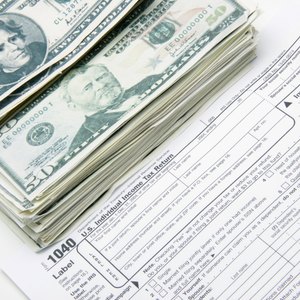
When you cash out a 401(k), the amount that you take out is a distribution that's added to your annual income by the Internal Revenue Service. The IRS penalizes owners of employer-sponsored retirement accounts who cash out their accounts early in a variety of ways. While there are some exceptions, these investors can expect to lose up to half of their distribution to taxes and penalties.
Penalty for Early Distributions
Early withdrawals from sponsored retirement plans almost always incur a 10 percent penalty. Nevertheless, the IRS allows 401(k) owners to take an early distribution without penalty in limited, emergency-type situations. For example, if you need the money to purchase a home, to pay for college or medical expenses or because you're disabled, the penalty doesn't apply (there are other acceptable reasons, too). These are typically called hardship withdrawals.
Aside from these special situations, your plan provider will automatically deduct the 10 percent penalty from your gross distribution.
Income Taxes on Withdrawals
In addition to automatically deducting the 10-percent early-withdrawal penalty, your provider will take out 20 percent for payment of income taxes. Keep in mind that your tax rate may be higher if you are in a higher tax bracket -- it could be as high as 37 percent in 2021. Your state may also tax retirement distributions, although not every state does.
Because your plan provider automatically makes these payments to the IRS, it is automatically alerted to the withdrawal, so failing to report these distributions almost guarantees interest and penalties.
Read More: When You Cash Out a 401k How Many Taxes are Due?
Getting in Trouble
You'll receive a 1099 statement in the mail that tells you how much you took as a distribution as well as how much you paid in income taxes on it. The IRS also gets a copy of this information. If you don't report what you withdrew, you'll not only owe additional taxes, but you'll also owe interest and penalties on the unpaid amount. There is no escaping the taxes and penalties on an early withdrawal on a 401(k).
It may take a while for the IRS to catch up to you, but when it does it won't be cheap. These fees add up quickly and may require a professional to undo, so think carefully before failing to report this income. In some cases, you can simply amend your tax return, if within the right time period, but not always.
Taking a 401(k) Loan Instead
Taking a loan against your 401(k) is probably more advantageous than taking a distribution. With a loan, you're borrowing from and making payments to yourself, with interest. You don't have to submit to a credit check, and you may be able to get the funds you need faster. You can make your loan payments directly through your paycheck, too (although the payments come out after tax).
Most importantly, although you'll miss out on capital appreciation, you won't incur any income taxes or penalties on the loan. Your plan provider will be able to tell you if you are eligible.
Read More: How to Cash Out a 401k When Terminated
References
Writer Bio
Lisa Bigelow is an independent writer with prior professional experience in the finance and fitness industries. She also writes a well-regarded political commentary column published in Fairfield, New Haven and Westchester counties in the New York City metro area.

